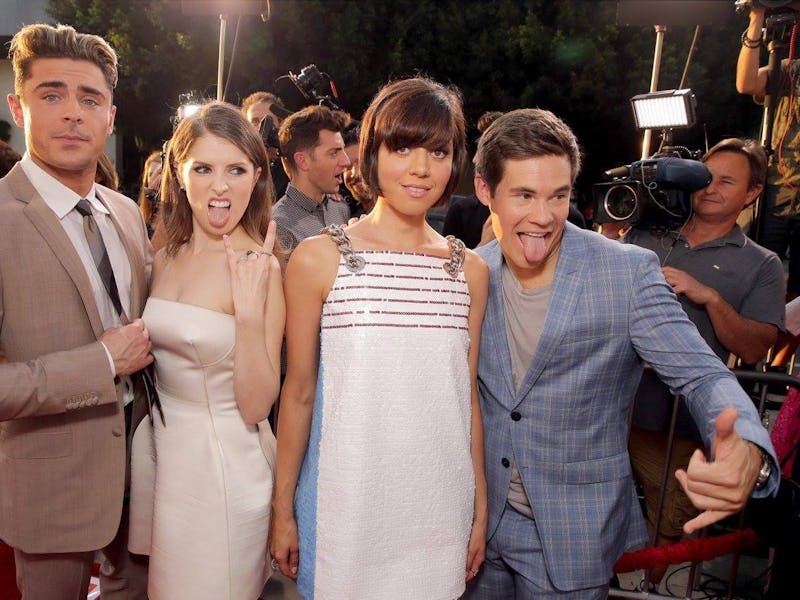‘Mike and Dave Need Wedding Dates’ Will Affirm Your Quarter-Life Crisis
The comedy, driven by Zac Efron and Aubrey Plaza, incorporates a decent amount of pseudo-psychology.

One of the oldest and most effective tropes in comedic film is the emergence of human maelstroms wreaking havoc on everything and everyone in their path. In some ways, this type of figure is the lifeblood of comedy, from Laurel and Hardy to Bringing Up Baby to Corky Romano to, you know, Tammy. Eventually, these walking disasters redeem themselves in some way, almost just as a practical way of bringing the movie to a close. Along the way, they usually earn the sympathies and admiration of the audience and their fellow ensemble members.
In relatively few instances, though, do the characters experience deep moments of theoretical, neurotic self-realization – in which they explore why, on the nearly subconscious level, they are such liabilities. This is the ultimate twist of Mike and Dave Meets Wedding Dates, a suitably puerile and ludicrous comedy which takes an unexpected deep dive into the #relatable psyches of its four protagonists in the final act, making for more moving characters than you normally see in Hollywood comedies about absolutely awful people.
The film — the handiwork of Funny or Die regular and director Jake Szymanski and Neighbors writer Andrew Jay Cohen — is based on the true story of brothers and quintessential bros Mike and Dave Stangel (played by Adam Devine and Zac Efron, respectively), who, in a conscripted effort to improve their reputation, put out a Craigslist ad seeking dates for their sister’s wedding. The attention? To appear, as Mike’s eventual date and erstwhile cocktail waitress Tatiana (Aubrey Plaza) puts it, “respectable as fuck.”
All four go to farcical lengths to appear as Normal Human Beings, in the process lampooning everything that sucks about white upper-middle-class people who aim to seem as put together as possible: mostly, self-congratulatory boasts about their professional lives (Anna Kendrick’s Alice pretends to work for a “fund that hedges” and drops the word NASDAQ for no reason) and fixed notions of masculinity and femininity (Plaza allows Mike to swoop in and rescue her after allowing herself to be hit by a car).
Eventually, the true freak in all of our antiheroes comes out, including the bride (the hilarious Sugar Lyn Beard) and groom (Veep’s Sam Richardson). Mike and Dave’s hot body mics, backstage before giving their rehearsal dinner speech, derail the wedding; Mike reveals that he tried to poison his disgustingly successful cousin (Alice Wetterlund). Kendrick’s Alice, deformed by a blow to the head from Mikes ATV on the Jurassic Park set, unlocks the bride’s reservations about marriage with an orgasmic massage and molly. Tatiana fingers Mike’s loathed cousin for “tickets to Ri-Ri.”
Eventually, both Mike and Dave, and the cleverer Tatiana and Alice (this apparent bro-comedy passes the Bechdel test), realize that they are in “co-dependent” relationships, and yes, that word is used. Their demeanor and destructive action compensate for insecurity and past trauma. In one of the best moments of the movie (a major moment of catharsis), Tatiana and Alice contemplate with horror and shame what it would be like to consider how anything they do affects the people around them.
In some ways, the two newly self-aware couples ride off to prospected “happily ever after”; in some sense, with Tatiana and Mike going off to run Mike’s questionable liquor business together, they are really just going to try to figure out what they might do in life other than ignore it. There are no real guarantees of success, but maybe they won’t continue to chasing the ideals they spend most of the movie mocking implicitly.
Whether or not you see the glass full or half empty, the wedding is a turning point for four people in the midst of a quarter-life crisis — the kind of moment which makes you, if only temporarily, reset and wonder why you do anything that you do. It’s as messy and vague as life itself.
Mike and Dave is, in some ways, cleverer in theory than execution. For one thing, it requires more Efron, whose understated comic timing, even as a semi-straight-man, is quietly more spot-on than any of his co-stars. But it’s not as conventional as it looks on paper. It’s not as structurally anarchic and risky as the far-superior Dirty Grandpa (also a great vehicle for both Plaza and Efron), but its farce with the appropriate amount of heart. The sentimental moments lean in to their own forced nature to humorous effect, and are all the more honest and effective for it.
Still, Mike and Dave ends with Plaza pegging Devine in a barn (just like Dirty Grandpa ends with her having sex with Robert DeNiro in a Miami hotel room). What do you expect? Life is formless chaos. This movie was advertised through fake Tinder profiles. So this film was pretty good — a welcome diversion. Time marches on.